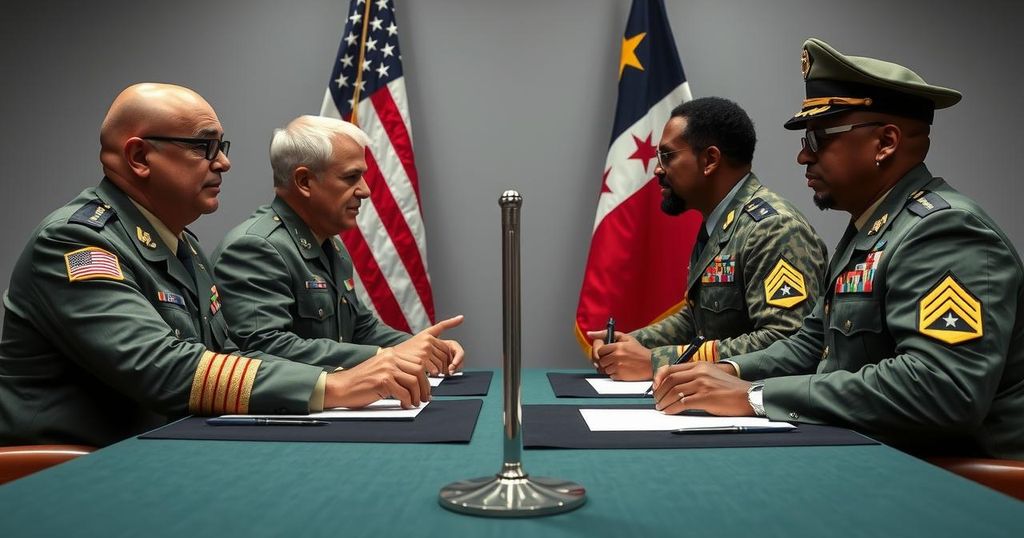Global news
ALVIN HOLSEY, BASIN SECURITY INITIATIVE TECHNICAL ASSISTANCE FIELD TEAM, BOLIVIA, CANDACE BOND, CARIBBEAN, DEFENSE, INTERNATIONAL RELATIONS, KEITH ROWLEY, MILITARY, NATIONAL SECURITY, NORTH AMERICA, PORT, PRIME, ROW, ROWLEY, SECURITY, SOFA, SOUTH AMERICA, SOUTHCOM, TRINIDAD, UNITED STATES, US, VENEZUELANALYSIS
Jamal Walker
0 Comments
US and Trinidad and Tobago Strengthen Military Ties Amid Venezuela Concerns
The United States and Trinidad and Tobago renewed key military agreements on December 10, 2024, including the Status of Forces Agreement. Prime Minister Rowley rejected claims suggesting troop deployments to address conflicts in Venezuela. The agreements signify enhanced defense collaboration, although they have raised concerns regarding military presence in the region amidst ongoing geopolitical tensions.
On December 10, 2024, the United States and Trinidad and Tobago renewed several military agreements, including the Status of Forces Agreement (SOFA), intended to enhance defense cooperation between the two nations. The US Department of Defense asserted that these accords, including extensions to the Caribbean Basin Security Initiative Technical Assistance Field Team and the Acquisition and Cross-Servicing Agreement, create unprecedented opportunities for collaboration. However, the agreements have drawn scrutiny over concerns that they could facilitate US military presence in the region, particularly related to potential conflicts in Venezuela.
Prime Minister Rowley firmly denied allegations reported by a local newspaper regarding potential troop deployments aimed at Venezuela, describing such claims as irresponsible. He emphasized Trinidad and Tobago’s commitment to regional peace and reiterated that the country would not serve as a staging ground for foreign military operations. Rowley further explained that the agreements do not change Trinidad’s long-standing position as a mediator in regional disputes, particularly concerning Venezuela.
The SOFA, originally signed in 2007 and renewed in 2013, has been amended to remain in effect indefinitely, offering various benefits to US military operations in Trinidad. Despite controversy, Rowley maintained that good relations with both the United States and Venezuela are paramount and noted ongoing energy collaborations between the two countries. Nevertheless, as Venezuela has condemned increased US military presence in the Caribbean, tensions remain heightened amid historical border disputes with Guyana.
The renewal of military agreements between the United States and Trinidad and Tobago occurs amid regional tensions, particularly involving Venezuela. Historically, the US has engaged Trinidad and Tobago for strategic military cooperation. This partnership is pivotal given Trinidad’s position in the Caribbean, which has seen rising concerns over US-led military operations and regional conflicts. The SOFA, with its provisions for defenses ties, plays a critical role in shaping military relations and operational protocols between the two nations. Additionally, increasing energy collaborations signal economic interdependencies even as geopolitical tensions persist.
In conclusion, the renewal of military agreements between the United States and Trinidad and Tobago marks a significant step in defense collaboration. While Prime Minister Rowley has refuted claims that these agreements pave the way for US troop deployments against Venezuela, the implications of such partnerships remain contentious. The international community watches closely as both nations navigate their diplomatic relations amidst intricate regional dynamics and ongoing tensions involving Venezuela and Guyana.
Original Source: venezuelanalysis.com




Post Comment